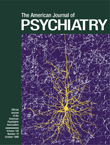Neuropsychological Functions in Patients With Schizophrenia
To the Editor: We read with interest the article by Jill M. Goldstein, Ph.D., et al. (1) about sex differences in neuropsychological functions in patients with schizophrenia, but we think their methodology was seriously flawed. Although the authors argued that their study was specifically designed to examine sex differences, they did not match patients and healthy comparison subjects pairwise with regard to relevant demographic characteristics such as gender, age, and education. In a recent study (2), our group also focused on gender differences in neuropsychological functions in schizophrenia by individually matching male and female patients with schizophrenia to healthy comparison subjects with regard to age, gender, and education. We showed that education has by far the highest impact on neuropsychological functioning, especially on verbal intelligence and language, spatial organization, verbal memory and learning, and abstraction-flexibility as measured by the Wisconsin Card Sorting Test. In the study group investigated by Dr. Goldstein et al., male patients with schizophrenia had significantly less education than male comparison subjects (12.9 versus 14.8 years; t=–2.6, df=28, p<0.02), whereas female patients with schizophrenia did not differ from their female comparison subjects with regard to education. Given this difference as well as the differences in reading test scores, spelling test scores, and estimated IQs—all to the disadvantage of male patients with schizophrenia—the most likely explanation of Dr. Goldstein and colleagues’ findings is that the poorer performance of men with schizophrenia is due to differences in education and IQ.
Further comments are related to the data analyses. While the authors tried to control for reading ability, a variable not significantly different between the groups, they did not control for the variables that revealed statistically significant group differences—namely, estimated IQ and spelling test scores. Furthermore, we cannot agree with the conclusions drawn by the authors regarding sex differences based on univariate analyses of variance of the functions. This is because they have not been corrected for multiple testing and especially because the sex-by-group interaction in the multivariate F test across functions is not significant (Wilks’s lambda=0.75, F=1.43, df=8, 34).
In summary, we agree with Dr. Goldstein and colleagues’ view that matching procedures are essential in comparing neuropsychological performance in subjects with schizophrenia. However, we disagree with the conclusions drawn by the authors, since relevant confounding variables were not adequately controlled in this study.
1. Goldstein JM, Seidman LJ, Goodman JM, Koren D, Lee H, Weintraub S, Tsuang MT: Are there sex differences in neuropsychological functions among patients with schizophrenia? Am J Psychiatry 1998; 155:1358–1364Google Scholar
2. Albus M, Hubmann W, Mohr F, Scherer J, Sobizack N, Franz U, Hecht S, Borrmann M, Wahlheim C: Are there gender differences in neuropsychological performance in patients with first-episode schizophrenia? Schizophr Res 1997; 28:39–50Google Scholar



